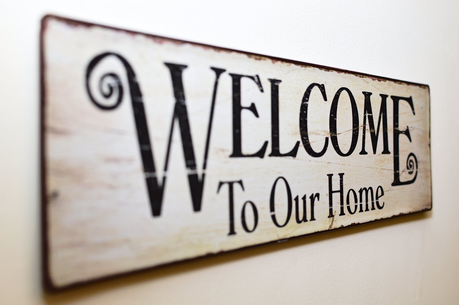It doesn’t matter if you’re not yet in the right financial position to think seriously about buying a home or not, because becoming a homeowner is a long-term goal that requires, and should only be done with, a lot of preparation. After all, not only is it the most significant financial hurdle you’re likely to cross in your life, but it’s also a responsibility that you’re going to need to make sure you’re equipped to handle. Here are a few ways to check whether or not you’re ready to be a homeowner!

Source – CC0 License
You have a reasonable idea of where you’re going to be in ten years
Buying a home is a big decision. It’s a financially momentous decision and we’re going to explore that in great depth further down the post, but it’s also a decision that is going to impact your lifestyle for a lot of time. You shouldn’t be thinking about buying and living in a home if, for instance, you’re expecting that you might need to move within the next two years. That wouldn’t be worth the costs of it. You should primarily be thinking about buying a home when you’re reasonably assured that you’re able to settle down where you buy it for some years for now.
You’ve found the area where you want to live
It’s not always the case, but it’s always a good idea to have an idea of where you want to livebefore you start house-hunting, not when you start house-hunting. It can be surprisingly difficult to find an area that ticks all of your boxes, offering the amenities you need, as well as the transport options to get where you need to go, not to mention a place that is as safe as you want for your family. This doesn’t mean you should have only one neighborhood in mind and settle for nothing less, but you should have a good idea of locations you would be happy to move into, after having done some research.
Know your house priorities
Of course, aside from where you want to live, you should be thinking hard about the kind of home you want in the first place, too. It’s always a good idea to think about the kind of dream home you want to live in, then to break down the different elements that make the house that you want. Come up with a list and separate them into wants vs needs. You need to make sure that you’re able to prioritize so not only can you find a home that meets all of your needs, but you know what you’re able to sacrifice in order to get the best deal possible. If you’re too picky and you treat all your “wants” as “needs” it can very time-consuming and costly to find the home that matches them.
You have a stable worklife
You might be making decent money and you might have even got a recent promotion or been hired to a position that has opened up the possibility of buying a home when it wasn’t previously available. However, that doesn’t mean that you’re ready to buy a home just yet. In fact, many lenders won’t even consider offering a home loan unless you’ve been working in your current job for at least two years. They want to make sure that not only is your money good, but you’re able to keep paying years from now. You should have the same concern in mind. Let your job settle for a while and make sure you have a stable position before you start looking to capitalize on it.
Do you have good financial habits?
The money it takes to buy a home is not the only thing you should be thinking of, but it is definitely one of the most important factors when it comes to buying a home. Aside from the question of getting a loan, it’s first important to make sure that you are in the right position to be buying a house when it comes to your financial habits. Simply put, if you’re not able to make room in your budget to pay for all of the aspects of homeownership, you should try to learn some more financially responsible practices. This includes planning a budget, limiting your discretionary spending, and putting money aside by delaying gratification, too.
Is your credit in good condition?
The vast majority of people aren’t going to be able to pay for their first home with cash. If you are, then you can skip this point. However, when it comes to why you should improve your credit score, buying a house is one of the biggest reasons. Aside from the price of the property itself, what kind of home loans you can apply for is going to determine how much you’re paying for the home, in total. Be sure to take a look at your existing credit score and your credit report. Aside from contesting any false black marks on your record, you should also look closely at using things like small loans and credit cards to build a positive credit history.
How are you handling your existing debt?
As mentioned, you’re likely to be using a loan to pay for the home, which means you should be thinking seriously about how loans and debt factor into your current lifestyle. If you are in a significant amount of credit card debt, personal loan debt, or student loan debt, then think about how well you are currently paying them off. Not only are you unlikely to get a good deal if you’re struggling to pay these, but you’re definitely not ready for the added strain of a home loan debt, as well. Look at ways to reduce and eliminate your debt, making sure that you have the room to take on the addition of home debt.
Have you saved up enough?
Once you have an idea of the kind of property that you want to buy and how much it is likely to cost, then you also need to think about how you’re going to pay it. Depending on what types of loans are available to you, then you might be able to take advantage of those that don’t require much of a down payment for you. However much of a down payment you need, however, you must be able to set savings goals to reach it. Determine how much of a down payment you should be saving and use the “Pay Yourself First” system to make sure that you’re always setting money aside to put towards it.
A little DIY goes a long way
Every home is going to need a little TLC and a little physical rejuvenation, whether you decide to start by buying something of a fixer-upper, or you have to deal with the wear and tear that every home is likely to experience. You can always hire someone to help you make the improvements that your home needs. However, it should go without saying that this is the more budget-heavy option. Learning to do a little DIY, from simple fixes to implementing some of the smaller renovations and upgrades yourself, can help you reduce the running costs of the home considerably over time. It never hurts to be a more capable individual, in general, either.
You have realistic investment expectations
Property can be a decent investment, but that’s not really the best reason to get into the housing market. The average price increase of homes across the country is in the single-digit percents once you get into the costs of improvements and inflation. If you’re looking primarily for an investment, then you should look at building an investment portfolio outside of the real estate market. There are ways to improve the value of the property you live in, of course, so that you can get a decent return should you ever want to sell it. However, buying a home as an investment, first and foremost, might not be the soundest strategy out there. Be realistic about how much you’re really likely to make when buying property.
You have real reasons to buy a home
If your reasons for buying a home aren’t much better than “it’s what I should do” or “I want to stop paying rent,” then you really need to reconsider why you want a house. It’s a long-term commitment to lock yourself into, so you should have good reasons for doing just that. Not paying rent is a good decision, but homeownership is often more expensive than you might think. Wanting to start a family, having real assets to your name, and settling down where you are planning to spend your career are all good reasons, for instance.
Of course, the only person who can judge whether or not you’re ready to start looking for a home is you. The above tips are just there to help you question yourself and see how you think about taking that step above all else.
Thank you for reading!


